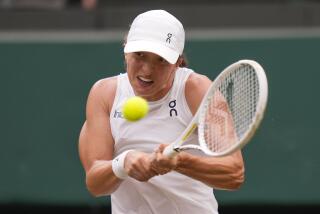One Match Doesnât Cure a Tournament
Hereâs a problem.
The name.
Officially these are âThe Home Depot Championships presented by Porsche.â
Is this a home-decorating contest or a Formula One race?
No, itâs a tennis tournament.
And hereâs another problem.
Theyâve marched into Staples Center, 16 of the best female tennis players in the world, one after the other, complaining about aches and pains and exhaustion, some of them limping off the court, others barely able to raise their racket arms.
It is the season-ending tournament, supposedly a gathering of the privileged, of the players who have worked hard to get here. Yet weâve heard lots of whining. âI must play less,â Jelena Dokic said before losing her final set of the season, 6-0, to Serena Williams. âIâm tired,â said Justine Henin, who went through tennis motions, barely, before losing to Kim Clijsters, 6-2, 6-1. Henin is not so tired that she wonât be able to play some European exhibitions next month.
This doesnât work either: weekday matches at 12:30 in the afternoon. Who goes? Kids are in school, grown-ups are at work.
What weâve seen too much of this week are empty seats and desultory tennis.
There have been crowds of fewer than 300 during the day and only a couple of thousand at night. You could practically hear Henin and Dokic breathe sighs of relief when they lost.
And there was Sundayâs first semifinal, where Venus Williams limped onto the court, her left calf wrapped tight in a bandage. Five games later, all won by Clijsters, and Williams called for the trainer, then packed her bag, hugged Clijsters and walked off the court.
âMy heart sank,â said Kevin Wulff, chief executive officer of the WTA. âBut then, we had a great match.â
Yes, there was a great match. Finally, a high-quality, three-set, momentum-changing, nail-biting match between two players who desperately wanted to win. By inches, by a missed line here, a net cord -- or two, or three -- there, Serena Williams beat Jennifer Capriati, 2-6, 6-4, 6-4, and most of the announced crowd of 8,164 forgot how Venus Williams had retired early.
But one match doesnât make a tournament, and this is a tournament that needs work.
Even now, with the tournament in progress, you can walk up to Staples Center and see not one banner, sign or poster, not one hint there is a tennis tournament going on. Officials said about $400,000 was spent in advertising, but that is small change in this market.
Weekday afternoon sessions Wednesday, Thursday and Friday drew fewer than 500 each day, and when some players seem more eager to start their vacations (and their lucrative exhibition seasons) than play competitive tennis, it raises the question of whether this tournament is worth having.
It used to be.
This culminating event, this supposed showcase for the WTA and its top players, had spent 20 mostly successful years at Madison Square Garden. Under various names, the longest-lived being the Virginia Slims Championships, the tournament was something of a happening. The final was best-of-five (until 1999), unusual for the women, and the Garden was usually packed, at least at night and for the semifinals and finals.
A year ago, with a tidy financial offer from German promoters and a desire to offer European fans a chance to see the championships, the tournament moved to Munich.
It was a disaster. Crowds were nonexistent. There wasnât even a championship match. Lindsay Davenport won her semifinal but hurt herself on one of the last points. She had to withdraw from the finals against Serena Williams without hitting a ball.
The German promoters were eager to get out of their contract. Staples Center came forward.
And here we are.
Billie Jean King, the perpetually optimistic saleswoman of womenâs tennis, says no one should be too quick to make this tournament a disaster or to remember fondly only the good old days in New York.
âIt took time to build the event,â King said. âThere were some pretty empty days at Madison Square Garden too. What was important was continuity. In my mind, it takes five years to build recognition for a tournament.â
King is not happy when she hears that players complained of exhaustion.
âOf course theyâre tired, I was tired at the end of the year,â King said. âBut after you say youâre tired, you say what a privilege it is to have earned your spot in the final 16. Thatâs what theyâve been killing themselves for.â
Despite some whispers that Madison Square Garden is angling to regain the tournament, Wulff says it will return to Staples next year. With changes, maybe, but it will return.
Wulff said that the afternoon sessions may need to be scrapped. The bad attendance early in the event âsets a certain negative tone,â he said. King suggested it might be necessary to go to a round-robin format, as the men have for their season-ending tournament.
A bit of the player exhaustion may be alleviated when the last tournament before the finals is in Philadelphia next year instead of Europe, making the time adjustment more gradual. But an 11-month season is too long with too much travel and too little recovery time.
And, Wulff said, more must be done to promote the tourâs most prestigious event.
First off, a different name might help. Mention tennis. Mention the WTA. And tell the players, all of them, to act as if this matters. Just showing up doesnât count. Wanting to win counts. Actually trying to win counts even more.
*
Diane Pucin can be reached at [email protected].
More to Read
Go beyond the scoreboard
Get the latest on L.A.'s teams in the daily Sports Report newsletter.
You may occasionally receive promotional content from the Los Angeles Times.










